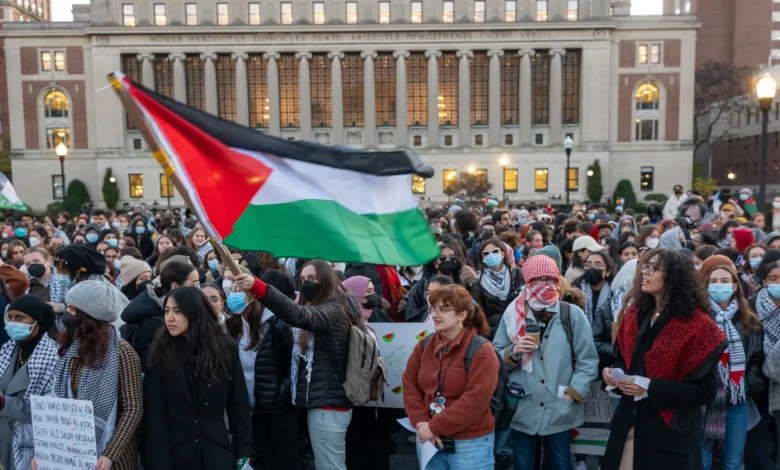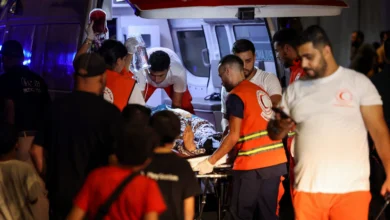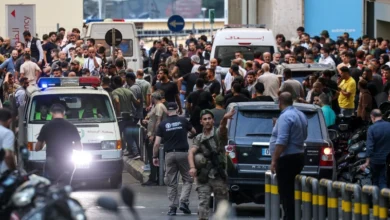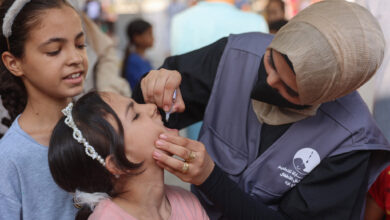Columbia University Sees Pro-Palestine Protests Return

Two were arrested on Tuesday, September 4, 2024, as pro-Palestinian protests outside Columbia University ushered in the return of students for the fall semester. New guidelines and leadership haven’t curbed tensions.
Video from NewsCopter 7 showed roughly a couple dozen demonstrators outside the school’s entrance in Morningside Heights. The NYPD put up barricades, and anyone entering the campus was subject to an identification screening. A university spokesperson released the following statement:
“The University welcomed new and returning students to a productive first day of classes on the Morningside Campus. As we welcome the new semester, we are committed to teaching, creating and advancing knowledge, and providing a safe and respectful campus environment for all community members.”
As classes resumed Tuesday, students and faculty were already planning for a resumption of the protests that convulsed the Manhattan campus at the tail end of the spring semester and touched off a wave of college demonstrations nationwide.
Recently, the university’s new leadership has embarked on listening sessions meant to cool tensions, released a report on campus antisemitism, and circulated new protest guidelines meant to limit disruption. But student organizers were undeterred, promising to ramp up their actions – including possible encampments – until the university agrees to cut ties with companies linked to Israel.
“As long as Columbia keeps on investing and benefiting from Israeli apartheid, students will keep on resisting,” said Mahmoud Khalil, a graduate student who represented campus protesters in negotiations with the university. “Not only protests and encampments, the limit is the sky.”
The start of the school year comes less than a month after the resignation of Colombia’s president, Minouche Shafik, who brought police onto campus twice last spring to clear out protest encampments. When a small group of students occupied a university building, hundreds of police officers surged onto campus, making arrests and plunging the university into lockdown.
Since Shafik’s resignation, the interim president, Katrina Armstrong, has met with students on both sides of the issue, promising to balance students’ rights to free expression and a safe learning environment. Although the message has inspired cautious optimism among some faculty, others see the prospect of major disruptions as all but inevitable.
“We are hoping for the best, but we are all wagering how long before we go into total lockdown again,” said Rebecca Korbin, a history professor who served on Columbia’s antisemitism task force. “There haven’t been any monumental changes, so I don’t know why the experience in the fall would look much different than it did in the spring.”
In a report published Friday, the task force – comprising Columbia faculty members-accused the university of having allowed “pervasive” antisemitism to fester across the campus in the aftermath of the October 7 Hamas attack. The report recommended that the university reassess its disciplinary process while requiring additional sensitivity training for students and staff.
Protests against the war have already started to bubble up this semester, both on college campuses and elsewhere, such as a protest at the University of Michigan that resulted in several arrests. Recent protests near Columbia may have been small, but a few dozen common signs of last spring’s tumult are not hard to find.
Tall iron gates, once wide open to the public, now have guards demanding that students show their identification before they enter campus. Privately hired security guards stand at the edges of the grassy lawn students commandeered for their encampment. A new plaque on a fence nearby declares “camping” forbidden.
Demonstrations against the war have already begun to bubble up on college campuses this semester, including one at the University of Michigan that ended in multiple arrests. While the few recent protests near Columbia have been minor, signs of last spring’s tumult are apparent.
The university’s tall iron gates – once long open to the public – are guarded now, with students forced to show identification to enter campus. Private security guards stand on the edge of the grassy lawns students had seized for their encampment. A new plaque on a nearby fence notes that “camping” is prohibited.”The University may restrict expression that constitutes a genuine threat of harassment, that unjustifiably invades an individual’s privacy, or that defames a specific individual,” the guidelines note.
Eduardo Vergara, a Columbia graduate student who teaches literature in the Spanish department, said many instructors entered the semester unsure about what they could and could not say in class. He fully expected to spend much of the semester discussing the war in Gaza and the reaction on campus. “It feels like everything is cool for now,” he added. “I don’t think that is going to last long.”




